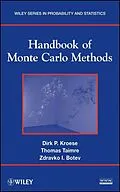A comprehensive overview of Monte Carlo simulation that explores
the latest topics, techniques, and real-world applications
More and more of today's numerical problems found in
engineering and finance are solved through Monte Carlo methods. The
heightened popularity of these methods and their continuing
development makes it important for researchers to have a
comprehensive understanding of the Monte Carlo approach.
Handbook of Monte Carlo Methods provides the theory,
algorithms, and applications that helps provide a thorough
understanding of the emerging dynamics of this rapidly-growing
field.
The authors begin with a discussion of fundamentals such as how
to generate random numbers on a computer. Subsequent chapters
discuss key Monte Carlo topics and methods, including:
* Random variable and stochastic process generation
* Markov chain Monte Carlo, featuring key algorithms such as the
Metropolis-Hastings method, the Gibbs sampler, and hit-and-run
* Discrete-event simulation
* Techniques for the statistical analysis of simulation data
including the delta method, steady-state estimation, and kernel
density estimation
* Variance reduction, including importance sampling, latin
hypercube sampling, and conditional Monte Carlo
* Estimation of derivatives and sensitivity analysis
* Advanced topics including cross-entropy, rare events, kernel
density estimation, quasi Monte Carlo, particle systems, and
randomized optimization
The presented theoretical concepts are illustrated with worked
examples that use MATLAB¯®, a related Web site
houses the MATLAB¯® code, allowing readers to work
hands-on with the material and also features the author's own
lecture notes on Monte Carlo methods. Detailed appendices provide
background material on probability theory, stochastic processes,
and mathematical statistics as well as the key optimization
concepts and techniques that are relevant to Monte Carlo
simulation.
Handbook of Monte Carlo Methods is an excellent reference
for applied statisticians and practitioners working in the fields
of engineering and finance who use or would like to learn how to
use Monte Carlo in their research. It is also a suitable supplement
for courses on Monte Carlo methods and computational statistics at
the upper-undergraduate and graduate levels.
Autorentext
Dirk P. Kroese, PhD, is Australian Professorial Fellow in Statistics at The University of Queensland (Australia). Dr. Kroese has more than seventy publications in such areas as stochastic modeling, randomized algorithms, computational statistics, and reliability. He is a pioneer of the cross-entropy method and the coauthor of Simulation and the Monte Carlo Method, Second Edition (Wiley).
Thomas Taimre, PhD, is a Postdoctoral Research Fellow at The University of Queensland. He currently focuses his research on Monte Carlo methods and simulation, from the theoretical foundations to performing computer implementations.
Zdravko I. Botev, PhD, is a Postdoctoral Research Fellow at the University of Montreal (Canada). His research interests include the splitting method for rare-event simulation and kernel density estimation. He is the author of one of the most widely used free MATLAB® statistical software programs for nonparametric kernel density estimation.
Klappentext
A comprehensive overview of Monte Carlo simulation that explores the latest topics, techniques, and real-world applications
More and more of today's numerical problems found in engineering and finance are solved through Monte Carlo methods. The heightened popularity of these methods and their continuing development makes it important for researchers to have a comprehensive understanding of the Monte Carlo approach. Handbook of Monte Carlo Methods provides the theory, algorithms, and applications that facilitate a thorough understanding of the emerging dynamics of this rapidly growing field.
The authors begin with a discussion of fundamentals such as how to generate random numbers on a computer. Subsequent chapters discuss key Monte Carlo topics and methods, including:
- Random variable and stochastic process generation
- Markov chain Monte Carlo, featuring key algorithms such as the Metropolis-Hastings method, the Gibbs sampler, and hit-and-run
- Discrete-event simulation
- Techniques for the statistical analysis of simulation data including the delta method, steady-state estimation, and kernel density estimation
- Variance reduction, including importance sampling, Latin hypercube sampling, and conditional Monte Carlo
- Estimation or derivatives and sensitivity analysis
- Advanced topics including cross-entropy, rare events, kernel density estimation, quasi-Monte Carlo, particle systems, and randomized optimization
The presented theoretical concepts are illustrated with worked examples that use MATLAB®. A related website houses the MATLAB® code, allowing readers to work hands-on with the material and also features the author's own lecture notes on Monte Carlo methods. Detailed appendices provide background on probability theory, stochastic processes, and mathematical statistics as well as the key optimization concepts and techniques that ate relevant to Monte Carlo simulation.
Handbook of Monte Carlo Methods is an excellent reference for applied statisticians and practitioners working in the fields of engineering and finance who use or would like to learn how to use Monte Carlo in their research. It is also a suitable supplement for courses on Monte Carlo methods and computational statistics as the upper-undergraduate and graduate levels.
Inhalt
Preface.
Acknowledgments.
1 Uniform Random Number Generation.
1.1 Random Numbers.
1.2 Generators Based on Linear Recurrences.
1.3 Combined Generators.
1.4 Other Gnerators.
1.5 Tests for Random Number Generators.
References.
2 Quasirandom Number Generation.
2.1 Multidimensional Integration.
2.2 Van der Corput and Digital Sequences.
2.3 Halton Sequences.
2.4 Faure Sequences.
2.5 Sobol' Sequences.
2.6 Lattice Methods.
2.7 Randomization and Scrambling.
References.
3 Random Variable Generation.
3.1 Generic Algorithms Based on Common Transformations.
3.2 Copulas.
3.3 Generation Methods for Various Random Objects.
References.
4 Probability Distributions.
4.1 Discrete Distributions.
4.2 Continuous Distributions.
4.3 Multivariate Distributions.
References.
5 Random Process Generation.
5.1 Gaussian Processes.
5.2 Markov Chains.
5.3 Markov Jump Processes.
5.4 Poisson Processes.
5.5 Wiener Process and Brownian Motion.
5.6 Stochastic Differential Equations and Diffusion Processes.
5.7 Brownian Bridge.
5.8 Geometric Brownian Motion.
5.9 Ornstein-Uhlenbeck Process.
5.10 Reflected Brownian Motion.
5.11 Fractional Brownian Motion.
5.12 Random Fields.
5.13 Lévy Processes.
5.14 Time Series.
References.
6 Markov Chain Monte Carlo.
6.1 Metropolis-Hastings Algorithm.
6.2 Gibbs Sampler.
6.3 Specialized Samplers.
6.4 Implementation Issues.
6.5 Perfect Sampling.
References.
7 Discrete Event Simulation.
7.1 Simulation Models.
7.2 Discrete Event Systems.
7.3 Event-Oriented Approach.
7.4 More Examples of Discrete Event Simulation.
References.
8 Statistical Analysis of Simulation Data.
8.1 Sim…
